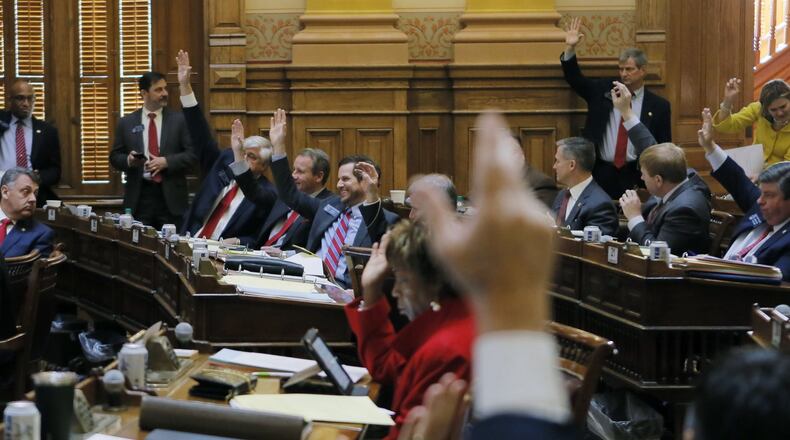A heated political fight over adoptions in Georgia ended Monday with state lawmakers approving a compromise designed to make it easier for children to find families.
The Georgia Senate, on a 53-2 vote, passed a broad measure meant to encourage adoptions in the state. Gov. Nathan Deal said he plans to sign the legislation into law after it unanimously cleared the state House last week.
The adoption bill, a priority for Deal and legislative leaders, is the first major piece of legislation to pass the Georgia General Assembly this year.
It survived "religious liberty" debates, election-year politics, a proposal Deal vetoed last year and even fears about baby selling — a claim that's not backed up by evidence.
In the end, the bill emerged from the Legislature without religious provisions, and it added requirements to ensure child safety.
By finally passing the bill, state House Speaker David Ralston said legislators focused on the interests of children and adoptive families.
“Sometimes I don’t know why it takes a long time to do the right thing,” said Ralston, a Republican from Blue Ridge. “This was important unfinished business.”
Parents will be more likely to adopt children in Georgia rather than travel to other states with less cumbersome laws, said state Rep. Bert Reeves, the sponsor of the proposal.
The 108-page adoption legislation, House Bill 159, would make many changes to Georgia's laws, which haven't been updated since 1990. Since then, the advent of the internet and broader acceptance of adoptions have made them more accessible across the country.
The bill would shorten the time allowed for a birth mother to change her mind after giving up her child for adoption, from 10 days to four days; make it legal for birth mothers to seek reimbursement of living expenses from adoptive parents in private adoptions; ban middlemen who profit from arranging adoptions; simplify out-of-state adoptions; and more.
The state Senate agreed to the bill despite concerns about permitting adoptive parents to reimburse birth mothers’ basic expenses for items such as rent, groceries and maternity clothes.
Those kinds of expense reimbursements are already allowed in adoptions handled by child-placement agencies. Expense payments are currently illegal for private, non-agency adoptions. Agency-run adoptions can cost $30,000, which is about three times more than private adoptions.
Credit: Bob Andres
Credit: Bob Andres
State Sen. David Shafer, a candidate for lieutenant governor, said reimbursing expenses could increase the price of adoptions.
Speaking on the Senate floor, Shafer said he was adopted for $100 in 1965. He said he voted for the bill because of the need to speed up the state’s adoption process.
“I believe the cost of adoption is too high and is unaffordable for many Georgia families,” said Shafer, a Duluth Republican. “Allowing the additional costs in this bill will make it even more burdensome for Georgia families to adopt.”
State Sen. Jesse Stone said that while 32 other states — including every state bordering Georgia — already allow expense reimbursements in private adoptions, the state needs to ensure that these payments aren’t used as a financial incentive for mothers to give up their children. Stone, a Waynesboro Republican, called for a study committee on the issue.
The adoption legislation was left hanging at the conclusion of last year's legislative session, caught up in an argument over religious freedoms.
After it passed the House unanimously, a Senate committee added language in March that would have allowed faith-based adoption agencies to refuse to place children with same-sex couples.
The full Senate didn't vote on the bill in the early-morning hours of the last day of the 2017 legislative session. This year, the Senate agreed to remove the religious provision so the other adoption provisions could move ahead.
But another amendment to the bill created further difficulties.
A Senate committee added language allowing power of attorney for a child to be transferred in some circumstances, such as when a parent is called away for military service or has problems with drugs. Deal had vetoed the measure because it lacked oversight to ensure the safety of the child.
After negotiations between the Senate and Deal, the House changed the bill to include background checks and court registries keeping track of children.
Deal said Monday that he looks forward to signing the adoption bill when it reaches his desk.
“These reforms will bring us in line with other states nationally while uniting children and parents in loving, permanent homes,” Deal said in a statement.
All families in Georgia going through an adoption will benefit from the changes in state law, said Reeves, a Marietta Republican.
“It’s going to give Georgians confidence that this is the place,” he said. “They don’t have to leave this state to adopt.”
Adoption changes in Georgia
House Bill 159, which the state Senate backed Monday by a 53-2 vote, is the first piece of major legislation to win approval this year in the Georgia General Assembly. Once it gains the signature of Gov. Nathan Deal, who supported the bill, it will:
- Shorten the time allowed for a birth mother to reverse her decision to give her child up for adoption, from 10 days to four days after signing adoption documents.
- Allow birth mothers to seek reimbursement from adoptive parents for basic living expenses in both private and agency-run adoptions.
- Ban advertisements and adoption payments from "facilitators," who are middlemen that arrange adoptions.
- Permit adoptions at age 21 instead of age 25 for relatives to adopt someone in their family, as in the case when both of a child's parents die.
- Allow out-of-state parents to finalize adoptions of Georgia children in state courts.
- Reduce the age to participate in Georgia's reunion registry from 21 to 18.
Source: House Bill 159
About the Author
Keep Reading
The Latest
Featured






